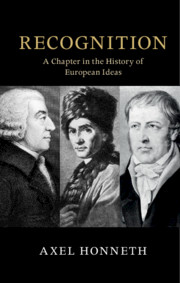3 - From Hume to Mill
Recognition and Self-Control
Published online by Cambridge University Press: 09 October 2020
Summary
This chapter shows that in the British intellectual tradition, the Scottish moralists, followed by Hume and Smith, saw reliance upon the opinion of others (“recognition”) in a completely different way than the French tradition. Instead of being viewed as something intrinsically negative and self-destructive, such reliance is described – sometimes with the same words – as something positive, contributing to epistemic and moral self-control. The central notions used in the British tradition to describe these positive effects of being dependent on others are “sympathy”, “inner spectator” and “impartial observer”. The chapter also shows that John Stuart Mill adopted the same line of thought by reserving a very positive role for the judgment of others. The chapter also attempts to identify sociopolitical reasons that may explain why such a positive understanding might have prevailed in British culture.
Keywords
- Type
- Chapter
- Information
- RecognitionA Chapter in the History of European Ideas, pp. 54 - 93Publisher: Cambridge University PressPrint publication year: 2020



